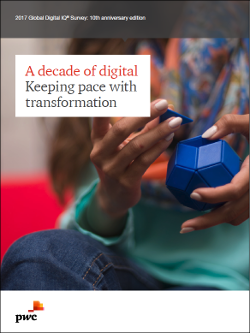Ungated Post | 31 Mar 2017
2017 Global Digital IQ® Survey: 10th anniversary edition

The world was a simpler place when PwC first set out to measure Digital IQ a decade ago. “Digital” was just another name for “IT.” The CIO was not generally regarded as a strategic leader. And putting new technologies to work was a relatively straightforward, and siloed, job. Oxford Economics worked with PwC on the tenth anniversary of its Digital IQ program, surveying more than 2,200 executives around the globe, to track the scope and scale of digital-driven change. The results show that although organizations have invested a lot of time and money on digital technology, many are struggling to keep up with accelerating standards.
Oxford Economics’ team is expert at applying advanced economic tools that provide valuable insights into today’s most pressing business, financial, and policy issues.
To find out more about our capabilities, contact:
Americas
Diantha Redd
+1 (646) 503 3052
Email
Asia Pacific
Peter Suomi
+65 6850 0110
Email
EMEA
Aoife Pearson
+44 (0)203 910 8054
Email
Related Services

Post
The economic impact of abandoning the WTO
Oxford Economics have been commissioned by the International Chamber of Commerce (ICC) to provide an independent assessment of the economic impact of WTO dissolution. This report details our findings and the assumptions underpinning our analysis.
Find Out More
Post
The economic impact of the sports activities of public service media
This study shows how the sports activities of public service media supported €4.5 billion of GDP and 57,000 jobs across 31 European countries in 2022. The report also highlights wider economic benefits of public service media sports coverage, such as the way in which it leverages sponsorship income for sports bodies.
Find Out More
Post
Global Trade Education: The role of private philanthropy
Global trade can amplify economic development and poverty alleviation. Capable leaders are required to put in place enabling conditions for trade, but currently these skills are underprovided in developing countries. For philanthropists, investing in trade leadership talent through graduate-level scholarships is an opportunity to make meaningful contributions that can multiply and sustain global economic development.
Find Out More